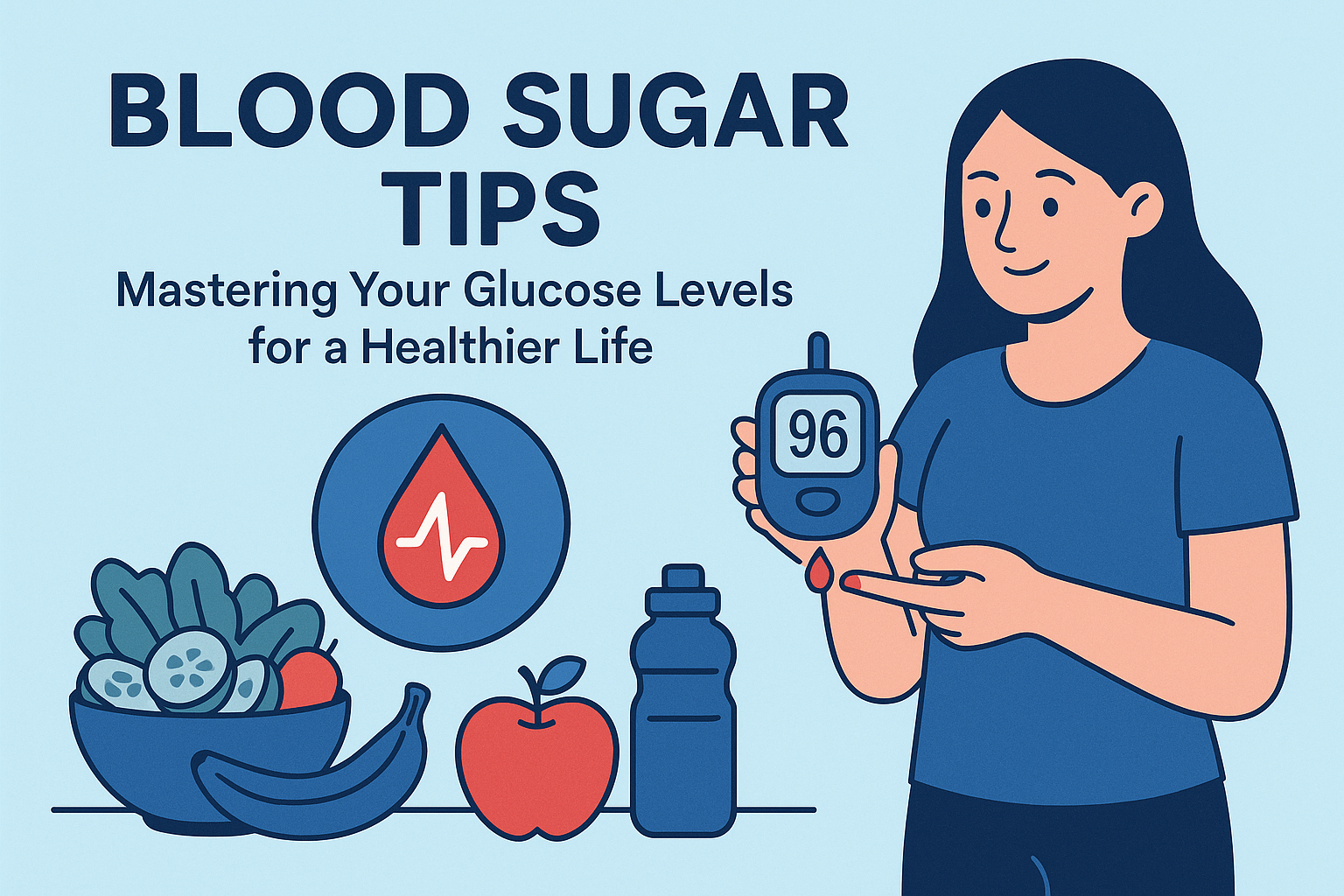Maintaining healthy blood sugar levels is essential for living a long, energetic, and disease-free life. Blood sugar, or blood glucose, is the body’s primary source of energy, fueling everything from brain function to physical activity. When glucose levels are stable, you feel energized, focused, and balanced throughout the day.
However, consistently high or low blood sugar can lead to serious health complications. Conditions such as type 2 diabetes, cardiovascular disease, nerve damage, and kidney issues often stem from poor blood sugar management. Recognizing these risks early and taking preventive steps can help protect your long-term health.
Whether you’re living with diabetes, prediabetes, or simply looking to improve your overall wellness, applying proven blood sugar tips can make a significant difference. In this guide, we’ll share the top 8 expert-recommended strategies to naturally regulate your blood sugar and maintain steady energy, improved mood, and better overall health every day.
Understanding Blood Sugar: Why It Matters

Understanding Blood Sugar: What You Need to Know (Blood Sugar Tips)
Before we get into blood sugar tips, it’s important to understand what blood sugar is and why it matters. Blood sugar, or glucose, is your body’s main source of energy. It comes from the carbohydrates you eat, which your body breaks down into glucose that enters your bloodstream.
In response, your pancreas releases insulin, a hormone that helps your cells absorb glucose for fuel. This process is vital for maintaining stable energy levels throughout the day. When everything works properly, your body uses glucose efficiently to keep you energized and functioning well.
However, issues can arise if this system becomes unbalanced. If your body doesn’t produce enough insulin or starts resisting it—a condition known as insulin resistance—blood sugar levels can spike or drop unpredictably. This can lead to fatigue, weight gain, and long-term health problems. That’s why following effective blood sugar tips is key to staying healthy.
Healthy blood sugar levels typically range:
- Fasting (before meals): 70 to 99 mg/dL
- Post-meal (1-2 hours after eating): Less than 140 mg/dL
- A1C (3-month average): Below 5.7% (non-diabetic range)
Now, let’s explore the top 8 blood sugar control tips that can help you achieve optimal levels.
Tip 1: Eat Balanced Meals with Low Glycemic Index Foods
Why Blood Sugar Control Matters (Blood Sugar Tips)
Managing your blood sugar is essential for maintaining steady energy levels and long-term health. One of the most important blood sugar tips is to be mindful of the foods you eat, especially those with a high glycemic index (GI). These foods cause your blood sugar to spike rapidly after eating.
When your blood sugar rises quickly, it’s often followed by a sudden crash. This can leave you feeling tired, irritable, and craving more sugar. Over time, repeated spikes and crashes can put stress on your body and increase your risk of developing insulin resistance.
Insulin resistance makes it harder for your cells to absorb glucose, which leads to even higher blood sugar levels. To prevent this cycle, focus on blood sugar tips like choosing low-GI foods, eating balanced meals, and avoiding excess sugar. These small changes can have a big impact on your overall health and energy.
What to do:
- Choose low-GI foods: These include legumes, whole grains (like quinoa and oats), non-starchy vegetables, and most fruits.
- Pair carbs with protein and fat: Combining carbohydrates with protein and healthy fats slows down glucose absorption.
- Avoid refined carbs and sugars: White bread, sugary cereals, soda, and desserts are high in GI and spike blood sugar rapidly.
Example meal:
Grilled salmon with quinoa, roasted broccoli, and a mixed green salad with olive oil dressing.
Tip 2: Be Smart About Portion Control

Portion Control and Blood Sugar Spikes (Blood Sugar Tips)
When it comes to managing blood sugar, the type of carbohydrate isn’t the only factor that matters—portion size plays a big role too. Even healthy carbs, like whole grains, fruits, and legumes, can lead to blood sugar spikes if eaten in large quantities. This is an important consideration when following blood sugar tips for better health.
While these foods are nutritious and packed with fiber, vitamins, and minerals, consuming them in excess can overwhelm your body’s ability to manage glucose effectively. This can result in a sharp rise in blood sugar levels, followed by a crash that leaves you feeling tired or hungry again.
One of the most effective blood sugar tips is practicing portion control. By eating balanced meals with moderate portions of healthy carbs, along with protein and healthy fats, you can maintain steady energy levels and support better blood sugar balance throughout the day.
What to do: (Blood Sugar Tips)
- Use the plate method: Fill half your plate with non-starchy vegetables, one quarter with lean protein, and one quarter with whole grains or starchy vegetables.
- Watch your carb intake: Work with a healthcare provider to determine your optimal carb amount per meal.
- Don’t skip meals: Eating regular, portion-controlled meals can prevent blood sugar highs and lows.
Pro tip: Using smaller plates or bowls can help visually reduce your portion sizes.
Tip 3: Stay Physically Active EWhy Exercise Matters for Blood Sugar Control
Exercise is one of the most powerful tools for maintaining healthy blood sugar levels. When you move your body, your muscles use more glucose for energy. This process lowers the amount of sugar in your bloodstream and helps keep levels balanced throughout the day.
Another key benefit is that regular physical activity improves insulin sensitivity. This means your body becomes more efficient at using insulin to transport glucose into cells. Over time, this reduces the risk of insulin resistance and supports long-term metabolic health. It’s one of the top blood sugar tips recommended by health professionals.
Whether it’s walking, dancing, strength training, or cycling, staying active helps your body manage blood sugar more effectively. Combine exercise with other blood sugar tips like eating low-glycemic foods and practicing portion control for even better results. Small lifestyle changes can make a big difference in how your body processes and regulates glucose.
- Aim for 30 minutes/day: Moderate exercise like brisk walking, swimming, or cycling can make a big impact.
- Incorporate strength training: Building muscle helps improve insulin sensitivity.
- Try walking after meals: A 10–15-minute walk after eating can significantly reduce post-meal glucose spikes.
Bonus benefit: Physical activity also supports weight loss, which can improve insulin function.
Tip 4: Monitor Your Blood Sugar Regularly
Why it matters: Why Monitoring Matters: A Key Blood Sugar Tip (Blood Sugar Tips)
One of the most important blood sugar tips is simple: you can’t manage what you don’t measure. Regularly checking your blood sugar levels gives you a clear picture of how your body reacts to different foods, activities, and stress. Without monitoring, it’s easy to overlook patterns or triggers that could be affecting your health.
Tracking your levels allows you to make smarter choices throughout the day. For example, you may notice that certain meals cause spikes, or that walking after eating helps stabilize your readings. These insights are valuable in creating a personalized routine that supports better blood sugar control and overall well-being.
Whether you use a glucometer or a continuous glucose monitor (CGM), staying consistent with checks is key. This is one of the most effective blood sugar tips for anyone managing diabetes, prediabetes, or simply aiming to maintain healthy glucose levels naturally and confidently.
You can’t manage what you don’t measure. Monitoring helps you understand how food, activity, and stress affect your levels.
What to do: (Blood Sugar Tips)
- Use a glucose meter or CGM (continuous glucose monitor).
- Track patterns: Record readings along with what you ate, your activity level, and any symptoms.
- Adjust accordingly: If certain foods or habits cause spikes, work with a dietitian to make changes.
Frequency: Diabetics may need to monitor multiple times daily. Non-diabetics can benefit from periodic checks or using a CGM for 1-2 weeks.
Tip 5: Manage Stress Effectively

Why it matters: One often overlooked but important blood sugar tip is understanding how stress impacts your glucose levels. When you’re stressed, your body releases hormones like cortisol and adrenaline. These hormones prepare your body for a “fight or flight” response, causing your liver to release more glucose into the bloodstream for quick energy.
This rise in blood sugar can be especially concerning for people with diabetes or those trying to manage their levels naturally. Chronic stress can lead to consistently higher blood sugar, making it harder to stay in a healthy range—even with a proper diet and exercise.
To keep your blood sugar stable, it’s important to include stress management in your routine. Try deep breathing, meditation, gentle exercise, or even short walks. Reducing stress is one of the most effective blood sugar tips for long-term control and overall health. Managing your mind is just as vital as managing your meals.
Stress hormones like cortisol and adrenaline can raise blood sugar levels.
What to do: (Blood Sugar Tips)
- Practice mindfulness: Meditation, deep breathing, and yoga are proven to reduce stress.
- Get adequate sleep: Poor sleep increases insulin resistance and appetite.
- Stay socially connected: Emotional support from family and friends reduces stress and improves overall well-being.
Pro tip: Keep a stress journal to identify triggers and track which coping strategies work best for you.
Tip 6: Stay Hydrated and Avoid Sugary Beverages
Why it matters: One of the most essential blood sugar tips is staying properly hydrated. When you’re dehydrated, your body has less water available in the bloodstream. As a result, glucose becomes more concentrated, which can lead to higher blood sugar levels. This effect can make it harder for your body to manage glucose, especially if you’re already dealing with diabetes or insulin resistance.
Even mild dehydration can trigger a rise in blood sugar, so it’s important to drink enough water throughout the day. Proper hydration helps your kidneys flush out excess sugar through urine and supports overall metabolic balance. Avoid sugary drinks and stick to water, herbal teas, or infused water with natural fruit slices.
Incorporating this simple habit into your daily routine can make a big difference. Among the many blood sugar tips available, drinking water regularly is one of the easiest and most effective ways to support stable glucose levels naturally.
Dehydration can cause blood sugar levels to rise as glucose becomes more concentrated in the bloodstream.
What to do: (Blood Sugar Tips)
- Drink water consistently throughout the day.
- Avoid sugary drinks: Soda, fruit juice, sweet tea, and energy drinks spike blood sugar dramatically.
- Infuse water with flavor: Add lemon, cucumber, or mint for a refreshing and healthy alternative.
How much water? Aim for at least 8 glasses per day (more if you’re active or live in a hot climate).
Tip 7: Sleep Like Your Health Depends on It (Because It Does)
Why it matters: One of the most overlooked but powerful blood sugar tips is getting enough quality sleep. When you don’t sleep well or get too little rest, it can negatively impact your body’s ability to manage glucose. Lack of sleep has been linked to insulin resistance, meaning your body doesn’t respond to insulin as effectively, which can lead to elevated blood sugar levels.
In addition to insulin resistance, sleep deprivation often increases hunger and cravings—especially for sugary and high-carb foods. This can lead to overeating, weight gain, and further spikes in blood sugar. Poor sleep also affects your energy levels, making it harder to stay active, which is another factor in blood sugar control.
Making sleep a priority is a smart and natural way to support balanced glucose levels. Among the many blood sugar tips, getting 7–9 hours of restful sleep each night is essential for long-term health and diabetes prevention.
Why it matters: Sleep deprivation can lead to insulin resistance, increased appetite, and elevated blood sugar levels.
What to do:
- Aim for 7–9 hours of quality sleep each night.
- Create a sleep routine: Go to bed and wake up at the same time daily, even on weekends.
- Limit screen time before bed: Blue light from phones or TVs can disrupt your circadian rhythm.
Sleep hygiene tips: (Blood Sugar Tips)
- Keep your room cool, dark, and quiet.
- Avoid caffeine and alcohol before bed.
- Try relaxation techniques like reading or a warm bath.
Tip 8: Maintain a Healthy Weight

Why it matters:One of the most important blood sugar tips for long-term health is managing your weight, especially reducing excess fat around the abdomen. Belly fat is not just stored energy—it actively affects your body’s hormones and metabolism. Too much abdominal fat can interfere with how your body uses insulin, leading to insulin resistance, a major cause of high blood sugar.
When your cells stop responding properly to insulin, glucose builds up in the bloodstream instead of being used for energy. This can increase the risk of type 2 diabetes and other metabolic issues. Reducing belly fat can improve insulin sensitivity and help bring your blood sugar levels back into a healthy range.
Combining a balanced diet, regular exercise, and good sleep habits is the best approach to manage weight and blood sugar. Among all the blood sugar tips, keeping a healthy waistline is one of the most effective ways to protect your health naturally.
Excess body fat—especially around the abdomen—can lead to insulin resistance and increased blood sugar.
What to do: (Blood Sugar Tips)
- Focus on fat loss, not just weight loss: Especially visceral fat, which is harmful to metabolic health.
- Combine diet and exercise: This duo is more effective than either strategy alone.
- Set realistic goals: Losing just 5–10% of your body weight can dramatically improve blood sugar control.
Bonus: Weight loss can also lower your risk of heart disease, stroke, and certain cancers.
Additional Strategies for Long-Term Blood Sugar Control
While the tips above are the foundation, here are some additional tools that can help:
- Intermittent fasting (with guidance): Can improve insulin sensitivity and promote fat loss.
- Supplements (consult your doctor): Magnesium, chromium, and berberine may support blood sugar control.
- Fiber intake: Aim for at least 25–30 grams per day from whole foods to slow digestion and improve insulin response.
- Probiotics and gut health: A healthy microbiome supports better metabolism and blood sugar regulation.
Foods That Help Lower Blood Sugar Naturally
- Leafy greens – Spinach, kale, and Swiss chard are low in carbs and rich in antioxidants.
- Cinnamon – May improve insulin sensitivity.
- Fatty fish – Salmon, sardines, and mackerel provide omega-3 fats that reduce inflammation.
- Nuts and seeds – Almonds, chia seeds, and flaxseeds provide fiber and healthy fats.
- Apple cider vinegar – When used before meals, may blunt blood sugar spikes.
- Beans and lentils – High in fiber and protein, with a low GI.
What to Avoid to Keep Blood Sugar Stable
- Refined carbs and sugar
- Highly processed snacks
- Excess alcohol
- Trans fats (found in fried and packaged foods)
- Skipping meals
Signs Your Blood Sugar May Be Out of Control
- Frequent thirst and urination
- Fatigue or drowsiness
- Blurred vision
- Unexplained weight loss or gain
- Increased hunger, especially after eating
- Slow-healing wounds
- Numbness or tingling in hands/feet
If you notice these symptoms, consult your healthcare provider for a blood glucose test.
Final Thoughts: Your Blood Sugar, Your Power
Blood sugar control isn’t just for people with diabetes—it’s a universal pillar of good health. By following these top 8 tips, you’ll not only stabilize your glucose levels but also enhance your energy, mood, and long-term well-being.
The key is consistency. Small, daily habits add up to major health transformations. Listen to your body, stay informed, and work closely with your healthcare team to tailor the best strategy for your lifestyle.
Frequently Asked Questions (FAQs)
1. What are the best foods to stabilize blood sugar?
Foods rich in fiber, protein, and healthy fats—like leafy greens, whole grains, nuts, and legumes—help stabilize blood sugar levels.
2. How often should I check my blood sugar?
If you’re diabetic, follow your doctor’s advice. Otherwise, checking occasionally when feeling symptoms can help monitor fluctuations.
3. Can exercise help lower blood sugar levels?
Yes, regular physical activity helps muscles use glucose for energy, improving insulin sensitivity and lowering blood sugar.
4. Are there any natural supplements for blood sugar control?
Yes. Cinnamon, berberine, and chromium are known to support healthy blood sugar, but consult your doctor before use.
5. What drinks help control blood sugar?
Water, herbal teas, and infused water (like lemon or cucumber) support hydration and blood sugar balance.
6. Does stress affect blood sugar levels?
Yes. Chronic stress can raise cortisol, which may increase blood sugar. Practice relaxation techniques to manage it.
7. How important is sleep for blood sugar balance?
Very. Poor sleep affects insulin sensitivity and hunger hormones, leading to higher blood sugar levels.
8. Do I need to avoid all sugar completely?
Not necessarily. Natural sugars from fruits are fine in moderation. Focus on reducing added and refined sugars.





